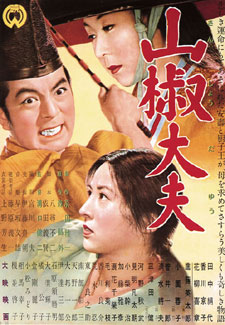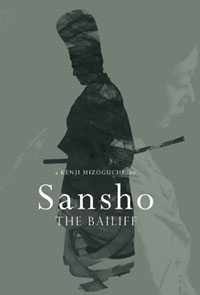 One of the great films of world cinema, Sansho the Bailiff (Sansho dayu, Daiei, 1954) is based on a classic short story by Mori Ogai (1862-1922).
One of the great films of world cinema, Sansho the Bailiff (Sansho dayu, Daiei, 1954) is based on a classic short story by Mori Ogai (1862-1922).
We are introduced to a compassionate & honest man, Masaji Taira (Masao Shimizu) of the Heian court in medieval Japan. His goodness annoys those who expect their corruption to be overlooked.
He is given a rural government position, where he attempts to treat the peasants justly. Moved by their suffering, he petitions the capital to ease their tax burdens, resulting in his being further regarded as a troublemaker, punished for his audacities.
His children are Anju (an early role for Keiko Enami, who grew up to star in a popular Onna tobakushi woman gambler series, 1967-1971) & Zushio (Masahiko Tsugawa), together with their mother (Kinuyo Tanaka), were for six years sheltered by their mother's brother, while the father dwelt in penurious exile.
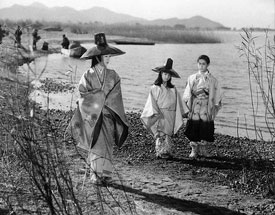 In time his family was cast off as a burden, to fend for themselves. They set off on a foot-journey toward the place of Masaji Taira's exile. In time his family was cast off as a burden, to fend for themselves. They set off on a foot-journey toward the place of Masaji Taira's exile.
Along the way, they fall into the clutches of a wicked priestess (Kikue Mori). The mother is sold as a prostitutte to the prison-island of Sado. The children given into slavery, & suffer at hard labor under the tyranical Sansho the Bailiff (Eitaro Shindo).
In the slave encampment, only one overseer shows compassion, Taro (Akitake Kono) tries to protect his wards from Sansho's viciousness. Sansho is his father, who regards his son's compassion as weakness, & feels only disdain for such a weakling.
After ten years of slavery, Zushio (now played by Yoshiaki Hanayagi) is eighteen, & known as Mutso. For a long time he tried to cling to his father's merciful tennets, but eventually his environment turned him into a harsh young man, forgetful of his father's teachings, rewarded with privileges by the overseers, & hated by fellow slaves.
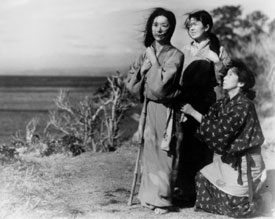 Evil acts abound in this world where corruption gains reward & ordinary people are treated as less than animals. Evil acts abound in this world where corruption gains reward & ordinary people are treated as less than animals.
Zushio's little sister Anjo (Kyoko Kagawa), who continues to honor her father's gentle precepts, is maturing into a beauty. It is not necessarily a good thing for a slave to be beautiful.
One day Zushio regains his humanity & flees slavery, vowing to return for his sister. He is assisted by Taro, who had left his father's employment to become a monk.
Anjo realizes she's apt to reveal her brother's plan because she will be subjected to torture. So she too flees captivity, but only so that she can commit suicide in peace. The scene where she walks into a lake is very disturbing in the way it comingles tragedy & beauty.
Zushio, not knowing what Anju has done, sets off for Kyoto to petition authorities, though Taro warns him how fruitless his efforts are apt to be. However, after further adversity, his bravery meets with unexpected success.
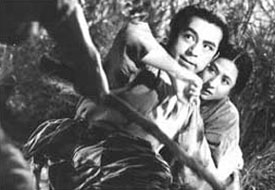 When his true identity is realized -- that he is the son of a just nobleman who died in exile -- Zushio is even permitted to inherit his late father's restored title of Governor, & assigned to the region of Tango, the very region terrorized by Sansho the Bailiff. When his true identity is realized -- that he is the son of a just nobleman who died in exile -- Zushio is even permitted to inherit his late father's restored title of Governor, & assigned to the region of Tango, the very region terrorized by Sansho the Bailiff.
His first intention is to liberate slaves, though this is is beyond his official powers. He nevertheless issues a decree criminalizing slavery, sending Sansho into exile as the slaves burn down Sansho's estate.
For overextending his authority, he resigns his post, then sets out for Sado Island in search of his mother. With many an alas at every turned, his path leads to the most pathetic of reunions & the inescapable understanding that "life is torture!"
In setting & costuming & Rashomon's cinematographer Kazuo Miyagawa behind the camera, Sansho the Bailiff is one of the visually most stunning films of cinematic history.
copyright © by Paghat the Ratgirl
|
